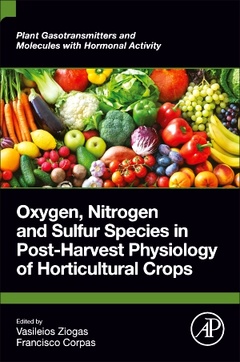Oxygen, Nitrogen and Sulfur Species in Post-Harvest Physiology of Horticultural Crops PLANT GASOTRANSMITTERS AND MOLECULES WITH HORMONAL ACTIVITY Series
Coordonnateurs : Ziogas Vasileios, Corpas Francisco J.

Oxygen, Nitrogen and Sulfur Species in Post-harvest Physiology of Horticultural Crops, a volume in the Plant Gasotransmitter series, analyzes the latest advances in post-harvest physiology. The book presents metabolic cascades and highlights the role of gasotransmitters as intercellular regulators of metabolic processes. Post-harvest physiology differs between climacteric and non-climacteric fruits and vegetables, as well as for fresh-cut flowers and non-food plants. Initial chapters review the cascades, intercellular pathways and messenger molecules that drive ripeness and longevity, presenting the chemistry behind key pathways. The books also takes a deep dive into core gasotransmitters, describing the data behind known properties, chemistry and physiological roles.
Applications for prolonging shelf-life via the control of post-harvest fungi, bacteria and omics approaches are reviewed in detail, offering readers guidance on how to put gasotransmitters research into practice. This is an essential resource for students, researchers and agronomists interested in plant physiology, biochemistry and plant hormones.
Francisco J. Corpas is a Research Professor of the Spanish National Research Council (CSIC) who has more than 30 years of research experience in the metabolism of Reactive Oxygen, Nitrogen and Sulfur Species (ROS, RNS and RSS, respectively) in higher plants under physiology and environmental stress conditions using the model plant Arabidopsis thaliana, as well as plants of agricultural interest. Research interests include the implications of these reactive species in fruit ripening and the nitro-oxidative metabolism of plant peroxisome. He was the Head of the Department of Biochemistry, Cell and Molecular Biology of Plants (2014-2018) at Research Institute named “Estación Experimental del Zaidín-CSIC, Granada, Spain. He has published more than 226 refereed research papers/review articles in peer-reviewed journals and has edited ten books.
- Describes the use and application of oxygen, nitrogen and sulfur species towards the prolonging of post-harvest shelf-life in agricultural products
- Explores eco-friendly alternatives to hazardous chemical compounds used to preserve fruits
- Presents metabolic cascades and evaluates the crosstalk and interaction of gasotransmitters within these cascades
Date de parution : 11-2023
Ouvrage de 394 p.
15x22.8 cm



